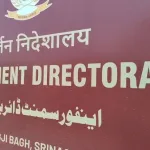COUNTERPOINT
Kashmir, renowned for its breathtaking landscapes and rich cultural heritage, faces a concerning issue – contaminated watermelon, purportedly linked to cancer. This controversy has sparked debates regarding the efficacy of cancer prevention campaigns in the region. While some argue that such campaigns are crucial for public health awareness, others contend that they might inadvertently exacerbate fear and hinder the fight against cancer. The Mushtaq Hurra sahib’s piece published in RKs 03 April opinion column raised a million dollar question, Is water melon the only edible which is contaminated? On flip side if physician’s would have recommended same water melon safe for eating, hyped media and trollers would not have spared any vocabulary like, “cut practice, agents, commission and what not.” This piece explores the nuances of this dilemma, examining whether doctors should refrain from issuing alerts on cancer prevention to avoid defeating the fight against cancer surge in Kashmir.
The Controversy
The controversy surrounding contaminated watermelon in Kashmir stems from reports suggesting the presence of carcinogenic substances in these fruits due to environmental pollution and improper agricultural practices. Concerns have been raised regarding the potential health risks associated with consuming such contaminated produce, including an increased risk of cancer. In response, health authorities and medical professionals have launched campaigns to raise awareness about cancer prevention measures, including dietary recommendations and lifestyle modifications.
Arguments for Halting Cancer Prevention Alerts
One perspective posits that issuing cancer prevention alerts in the context of contaminated watermelon may inadvertently fuel panic and anxiety among the populace. Such alerts could lead to unwarranted fear and stigma associated with consuming fruits, undermining public trust in agricultural produce and exacerbating economic repercussions for local farmers. Moreover, critics argue that focusing solely on cancer prevention alerts may overshadow efforts to address the root causes of contamination and pollution in Kashmir’s agricultural practices. Instead of fostering a proactive approach to tackling environmental health issues, these alerts may perpetuate a reactive stance that overlooks broader systemic challenges. Furthermore, some contend that overly alarming messages about cancer risks could result in information fatigue, where individuals become desensitized to health warnings due to their frequency and perceived exaggeration. This desensitization may lead to complacency regarding cancer prevention measures, as individuals may disregard alerts as exaggerated or alarmist.
Arguments for Continuing Cancer Prevention Alerts
On the other hand, proponents of cancer prevention alerts argue that raising awareness about potential health risks associated with contaminated watermelon is essential for public health protection. Ignoring or downplaying these risks could leave consumers vulnerable to exposure to harmful substances, exacerbating the incidence of cancer and other health conditions. By providing information on preventive measures, such as washing fruits thoroughly or opting for organic produce, health authorities empower individuals to make informed choices about their dietary habits, thereby reducing their risk of exposure to contaminants.
Moreover, proponents contend that cancer prevention campaigns play a crucial role in fostering a culture of health consciousness and proactive disease prevention. By promoting healthy lifestyle behaviors and dietary choices, these campaigns contribute to long-term public health outcomes beyond mitigating the immediate risks posed by contaminated watermelon. Rather than hindering the fight against cancer, such initiatives serve as valuable tools for empowering individuals to take control of their health and reduce their overall risk of developing cancer.
Restrain versus medical activism, balancing perspectives
Finding a balance between raising awareness about cancer risks and avoiding undue fear and panic is imperative in addressing the contaminated watermelon controversy in Kashmir. While it is essential to communicate potential health hazards associated with consuming contaminated produce, it is equally important to frame these messages in a manner that promotes informed decision-making without causing unnecessary alarm.
The concept of “prevention is better than cure” is indeed a fundamental principle in public health. Preventive measures, such as raising awareness about potential environmental carcinogens in food additives or chemical ripening agents used in fruits, play a crucial role in minimizing health risks and promoting overall well-being. However, the implementation of preventive measures must be carefully balanced with considerations for the economic implications on food and fruit vendors. While it may be tempting to advocate for halting alerts on potential environmental carcinogens to avoid impacting food and fruit vendors, it is essential to recognize that public health should remain the foremost priority.
Ignoring or downplaying health risks associated with contaminated food products could have severe consequences for consumers, including an increased incidence of diseases such as cancer. Instead of ceasing alerts altogether, a more constructive approach would involve working collaboratively with food and fruit vendors to address concerns and find mutually beneficial solutions. This may include promoting sustainable agricultural practices that minimize reliance on harmful chemicals, supporting vendors in sourcing safer alternatives, and providing education and resources to enhance food safety practices.
Furthermore, transparent communication and consumer education are essential components of effective preventive measures. By empowering consumers with accurate information about potential health risks and practical strategies for minimizing exposure to carcinogens, individuals can make informed choices that prioritize their health and well-being.
How do you make a Redline? The reassurance from the Food and Adulteration department likely aimed to address any concerns regarding the safety and quality of food items, including watermelon to prove that alert was wrong the vendors further went to an extreme of defying God’s order broke the fast with water melon in open public before Iftar time displays the strong ramifications of cancer awareness program anyway public trust could not be restored eventually intended sales target of watermelon sales this Ramadan had a drop upto 40 %.
While considerations for the economic impact on food and fruit vendors are important, public health imperatives should not be compromised. Preventive measures, including alerts on potential environmental carcinogens, are vital for safeguarding the health and safety of consumers. By fostering collaboration, education, and innovation, stakeholders can work towards achieving a balance between protecting public health and supporting economic interests in the food industry.
Health authorities and medical professionals should adopt a nuanced approach to communication, emphasizing practical preventive measures while acknowledging the broader socioeconomic and environmental factors contributing to contamination. Collaborative efforts involving government agencies, agricultural stakeholders, and community leaders are necessary to address the root causes of pollution and implement sustainable solutions to safeguard public health. Isn’t prevention better than cure the controversy surrounding contaminated watermelon in Kashmir underscores the complex interplay between public health awareness, environmental concerns, and socioeconomic factors.
While cancer prevention campaigns are crucial for informing the public about potential health risks, it is essential to strike a balance between raising awareness and avoiding undue panic. By adopting a multifaceted approach that addresses both the immediate health concerns and the underlying systemic issues contributing to contamination, stakeholders can work towards mitigating the risks associated with contaminated produce while promoting long-term public health and environmental sustainability in Kashmir.
(Author is Senior Consultant Surgeon, Columnist, blogger Healthcare (cancer awareness & prevention) Improvement of Healthcare-standards, Safety; Moral Ethics in healthcare & hospitals. Feedback: [email protected])








